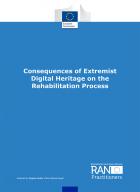Details
- Publication date
- 14 December 2021
- Author
- Directorate-General for Migration and Home Affairs
- RAN Publications Topic
- Internet and radicalisation
Description
The diffusion of digital extremist content by individuals and extremist groups, as well as the way in which this content and terrorism-related events are reported by news media, have increasingly raised concerns regarding:
- the perpetuation of violent extremist propaganda;
- pathways to radicalisation; and
- the potential recruitment and mobilisation of at-risk individuals.
However, little attention has been paid to how digital remainders of former extremist activities may be impacting on the disengagement and rehabilitation processes of former extremists. Most former extremists are concerned about how their past will be perceived and understood and how it will impact them.
In addressing this significant issue, this report will focus on four key questions:
- Which types of extremist digital heritage exist and which are the most common and relevant examples regarding rehabilitation?
- How can these impact on the rehabilitation and long-term stabilisation process of former extremists?
- How can negative consequences best be dealt with?
- Which practitioner groups can and should be involved in dealing with this issue and how?
The report builds its findings on first-hand experiences of exit workers, law enforcement practitioners, youth workers, social workers, and prison and probation officers as well as former extremists from Europe, Canada and Australia.

